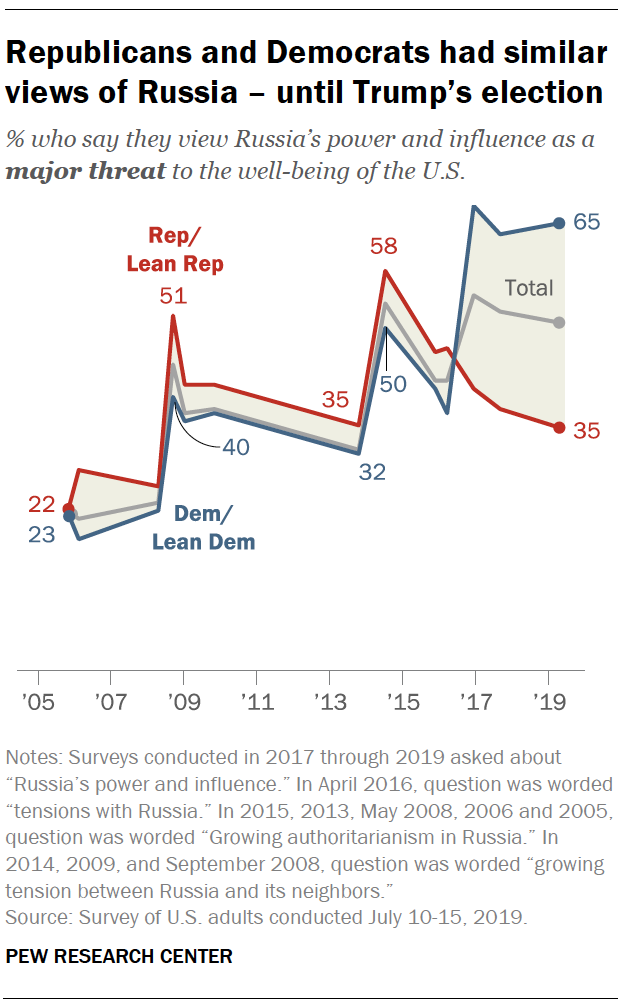The public’s views of two global threats facing the United States have changed in the past few years. Far fewer Americans view North Korea’s nuclear program as a major threat to the well-being of the U.S. than did so two years ago. Over the same period, there also has been a sharp decline in the share saying that ISIS represents a major threat to the U.S.
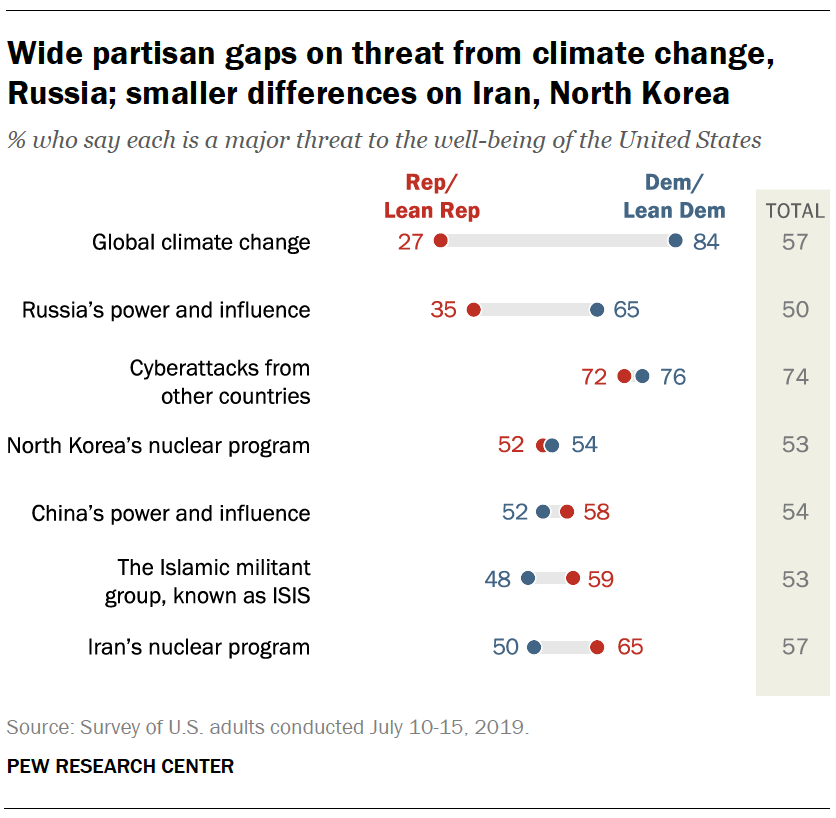
By contrast, views of other possible threats, including cyberattacks from other countries and Iran’s nuclear program, remain largely unchanged. And Republicans and Democrats remain far apart over the seriousness of two global threats – climate change and Russia’s power and influence.
Global climate change has been a deeply divisive issue for much of the past decade. Among seven global issues included in a new survey, climate change ranks as the top international threat among Democrats and Democratic-leaning independents (84% say it is major threat) and the lowest-ranked threat among Republicans and Republican leaners (27%).
Sizable partisan divisions over the threat from Russia, by contrast, emerged only during the 2016 campaign. Currently, 65% of Democrats say Russia’s power and influence is a major threat to U.S. well-being, compared with just 35% of Republicans.
The survey by Pew Research Center, conducted July 10-15 among 1,502 adults, finds that while perceptions of the threat from North Korea have declined – with the decrease coming among members of both parties – Americans remain skeptical of whether North Korea’s leaders are serious in dealing with concerns about the country’s nuclear program.
Nearly six-in-ten Americans (58%) say North Korea’s leaders are not serious in addressing concerns about the country’s nuclear program, while 35% say they are serious. The share doubting the seriousness of North Korea’s leaders has risen from 49% a little more than a year ago – with the increase primarily coming among Democrats.
Public concerns about China’s power and influence have increased since 2017; currently 54% say China’s power and influence are a major threat, up from 46% in 2017. In addition, there has been a significant decline in the share saying China is “not much of problem,” from 34% last year to 24% today. Over this period, the shares saying either that China is an adversary or that it is a serious problem have increased.
Still, when it comes to trade and economic issues with China, more Americans favor cooperation to “getting tougher” with Beijing. A 62% majority say that in U.S. trade and economic policy toward China, it is more important to build a stronger relationship, while just 35% say it is more important to get tougher with China.
Among other major findings from the survey:
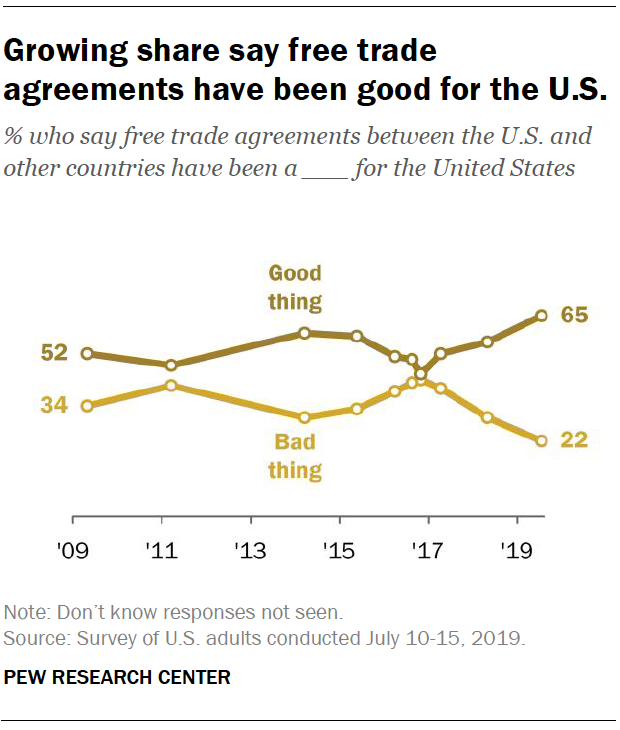
Americans’ views of free trade agreements have grown increasingly positive. Today, 65% of the public says free trade agreements between the U.S. and other countries have been a good thing for the United States and 22% say they have been a bad thing. While Democrats have been consistently positive about free trade agreements in recent years, Republicans turned more negative during the 2016 presidential campaign. But today, 59% of Republicans say free trade agreements are good for the U.S – roughly double the share who said this in October 2016 (29%).
Deep partisan divide on U.S. approach to Iran. In dealing with the dispute over Iran’s nuclear program, somewhat more Americans say it is more important to avoid a military conflict with Iran (49%) than to take a firm stand against Iranian actions (44%). Republicans are nearly three times as likely as Democrats to say the U.S. should take a firm stand against Iran (68% vs. 23%).
Republicans increasingly say the U.S. is “more respected” abroad. Today, 40% of Republicans say that, compared with the past, the U.S. is more respected by other countries – the highest share saying this over question the 15 years the question has been asked. Republicans’ views of global respect for the U.S. have grown much more positive since Trump took office. By contrast, 82% of Democrats say the U.S. is less respected than in the past.
Changing views of global threats
The public’s views of global concerns have shifted over the past two years. Compared with 2017, larger shares now see China’s power and influence and Iran’s nuclear program as a major threat, while significantly fewer see ISIS or North Korea’s nuclear program as threatening.
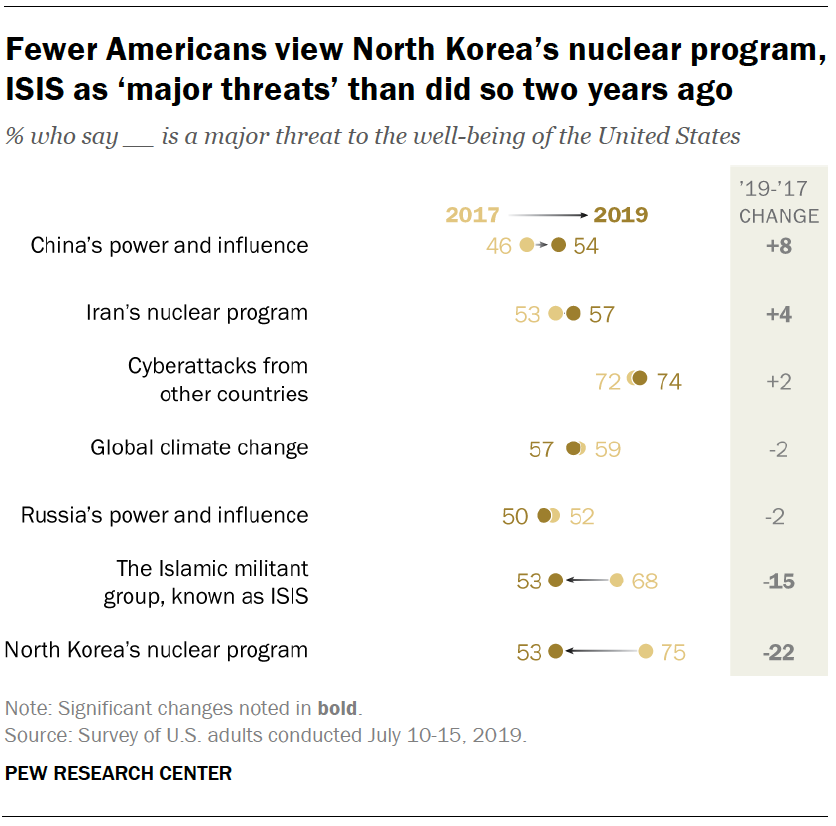
The rise in concern over China is seen in both parties: The share of Republicans who say China’s power and influence is a major threat has increased 10 percentage points among Republicans (from 48% to 58%) and 9 points among Democrats (43% to 52%).
A slightly larger share of adults also say that Iran’s nuclear program is a major threat compared with 2017 (53% then vs. 57% today).
There has been little change in the public’s views of the threats from cyberattacks, global climate change, or Russia’s power and influence.
By contrast, fewer adults now view the Islamic militant group known as ISIS as a major threat. In 2017, nearly seven-in-ten (68%) viewed ISIS as a major threat to the U.S. Today, only about half of Americans (53%) express this view. Both Republicans and Democrats are less likely to characterize ISIS as a major threat than they were two years ago.
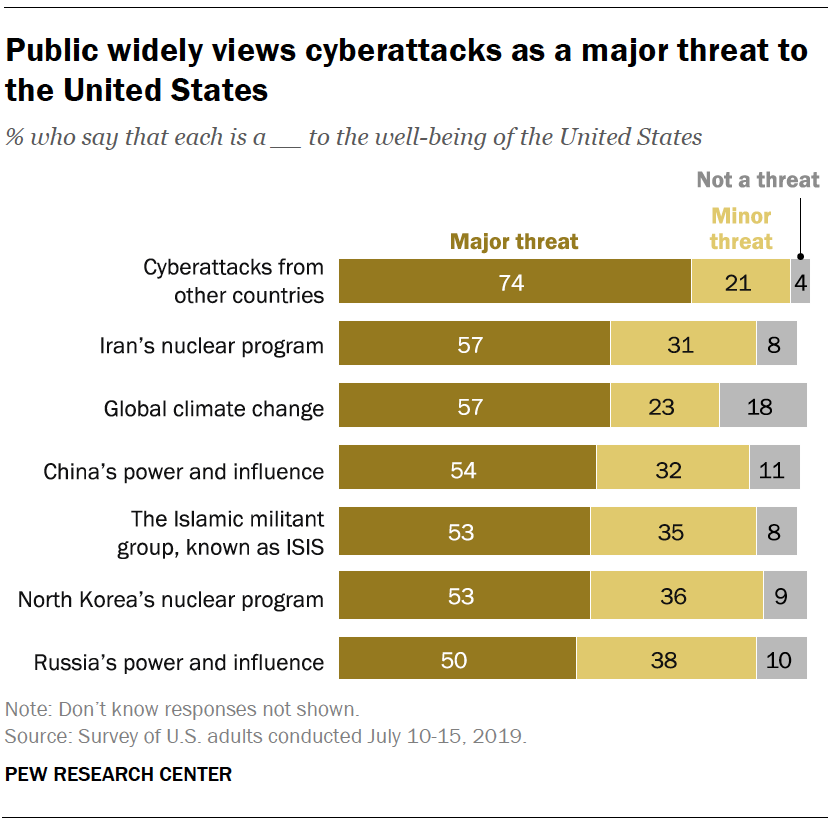
The public is also considerably less likely to see North Korea as a major threat than in October 2017. Then, 75% of adults saw North Korea’s nuclear program as a major threat. Today, just 53% say this – a 22-point decrease – with the decline coming fairly equally among members of both parties.
The threat of cyberattacks from other countries has been among the public’s top threats for several years. In the current survey, 74% say cyberattacks are a major threat to the well-being of the U.S., which is greater than the shares saying that about Iran’s nuclear program (57%), global climate change (also 57%) or other issues.
Majority of Americans doubt North Korea is ‘serious’ about nuclear concerns
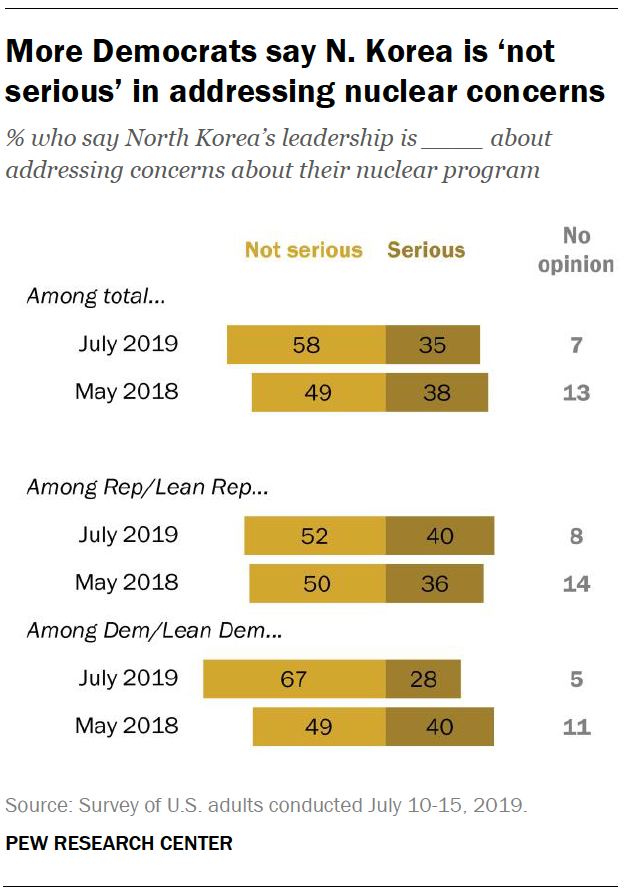
As was true in May 2018, the public is skeptical about whether North Korea’s leaders are serious about addressing concerns over its nuclear program.
Overall, 58% say North Korea’s leadership is not serious about addressing international concerns about their country’s nuclear enrichment program. This is higher than the share that said this in May 2018 (49%). Today, 35% say they think North Korea’s leadership is serious about addressing these concerns – similar to the share who expressed this view in 2018.
But while there was no partisan gap in these views a year ago, there is a large gap today; this is mostly attributable to the growing share of Democrats who say North Korea’s leadership is not serious about addressing nuclear concerns (49% in 2018 vs. 67% today).
In contrast, Republicans’ views are little changed over the past year. As in 2018, slightly more Republicans say North Korea’s leadership is not serious about addressing its nuclear enrichment program (52%) than say they are serious (40%).
Public divided on taking ‘firm stand’ with Iran or avoiding conflict
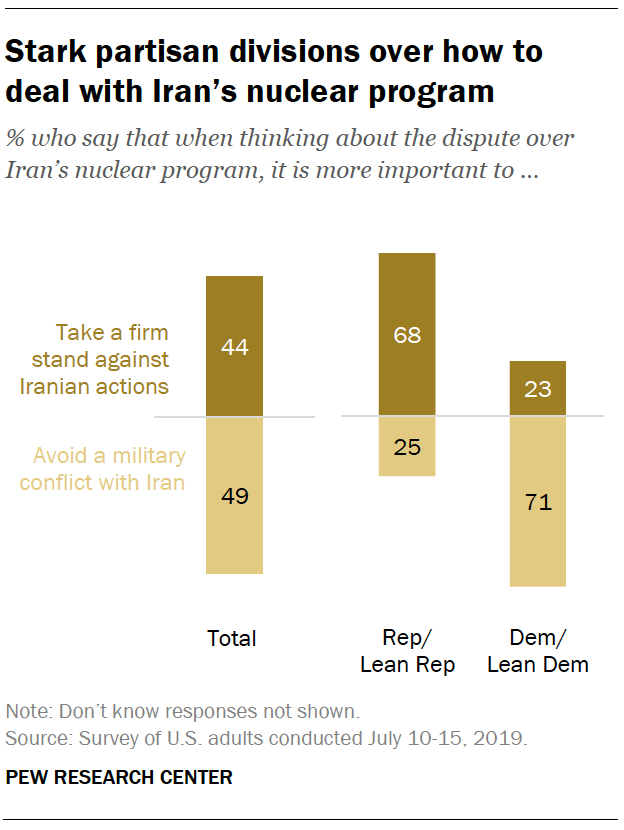
Just as there are partisan differences in views of whether Iran poses a major threat to the United States, Republicans and Democrats prioritize different approaches to the dispute over Iran’s nuclear program.
Overall, the public is divided about whether it is more important to take a firm stand against Iranian actions (44%) or to avoid a military conflict with Iran (49%).
But while 68% of Republicans say it is more important to take a firm stand against Iranian actions, the balance of opinion is flipped among Democrats. Roughly seven-in-ten Democrats (71%) say it is more important to avoid a military conflict with Iran.
Just a quarter of Republicans (25%) say it is more important to avoid a conflict, while a similar share of Democrats (23%) say they would prefer that the U.S. take a firm stand against Iranian actions.
Growing partisan divides in views of Russia
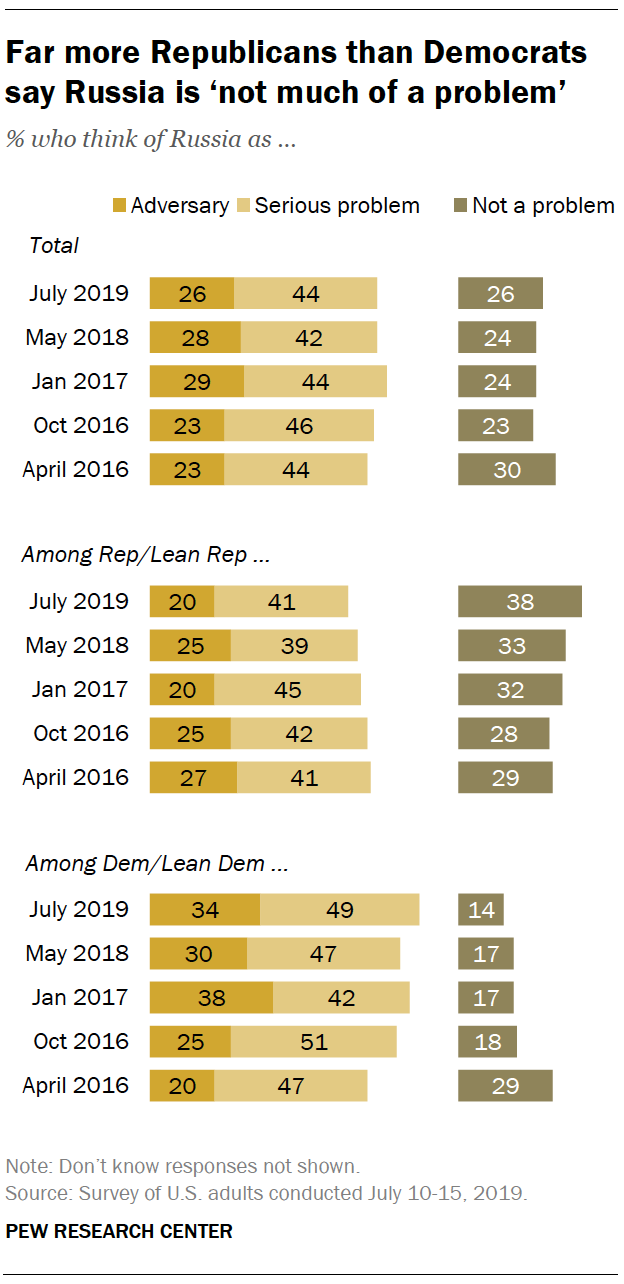
About a quarter of adults (26%) say they view Russia as an adversary, while a plurality (44%) say they think it is a serious problem, but not an adversary; 26% say they do not think of Russia as a problem.
Overall, these views are little changed over the past few years, but the partisan divide in opinion has continued to grow. Democrats are now significantly more likely than Republicans to say Russia is an adversary (34% to 20%, respectively), while Republicans are more than twice as likely as Democrats to say Russia is “not much of a problem” (38% to 14%).
The share of Republicans saying Russia is not a problem is now slightly higher than it was a year ago (38% now, 33% then) and substantially higher than in the spring of 2016 (29%).
Among Democrats, these views have remained relatively stable over the past two years, but Democrats remain far less likely to say Russia is not a problem than they were in early 2016: Just 14% say this today, while 29% said this in April 2016.
Today, half of adults (50%) say they view Russia’s power and influence as “a major threat” to the well-being of the U.S., while 38% view this as a minor threat. Just 10% say it is not a threat. These overall views are little changed since October 2017.
But perceptions of the threat Russia poses to the U.S. have grown increasingly partisan in recent years, with Democrats much more likely than Republicans to perceive Russia as a threat. Historically, Democrats’ and Republicans’ views of Russia have mostly shifted together. In addition, from 2005 through 2016, the partisan divides in slightly different questions about Russia were much less pronounced than they are today – and in those years Republicans tended to be more likely than Democrats to view aspects of Russia’s government, or its relationship with its neighbors, as a major threat to the U.S.
(Surveys from 2005 to 2015 asked about either tension between Russia and its neighbors or growing authoritarianism in Russia; 2016 asked about tensions with Russia.)
As recently as April 2016, a larger share of Republicans than Democrats said “tensions with Russia” were a major threat to the well-being of the United States (46% of Republicans vs. 37% of Democrats).
Today, just 35% of Republicans say Russia’s power and influence is a major threat to the well-being of the U.S. – among the lowest share seeing Russia as a major threat in the past decade. By contrast, 65% of Democrats now say Russia’s power and influence is a major threat to the U.S. – and while this is little changed since 2017, a far larger share of Democrats view Russia as a threat today than did so in surveys dating back to 2005.
Concern over China rises
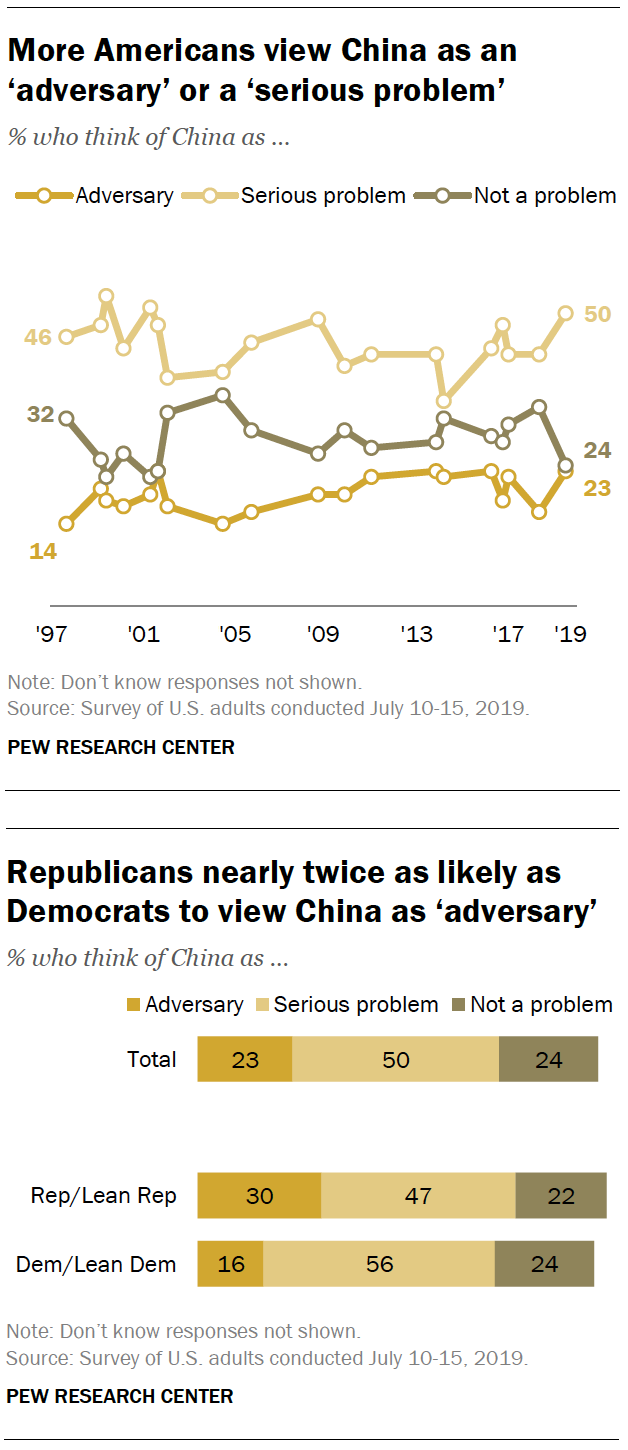
Today, about a quarter of adults (23%) say they consider China to be an adversary, while half (50%) say is China a serious problem but not an adversary. In May 2018, just 16% said they saw China as an adversary. The share saying China is a serious problem has also increased 7 percentage points since last year.
The share of Americans saying they do not think China is much of a problem is now 10 percentage points lower than it was in May 2018 (24% now, 34% then). This is among the smallest share saying this in more than a decade.
Though wide majorities of both Republicans and Democrats view China as at least a serious problem, Republicans are more likely to say China is an adversary (30% vs. 16%).
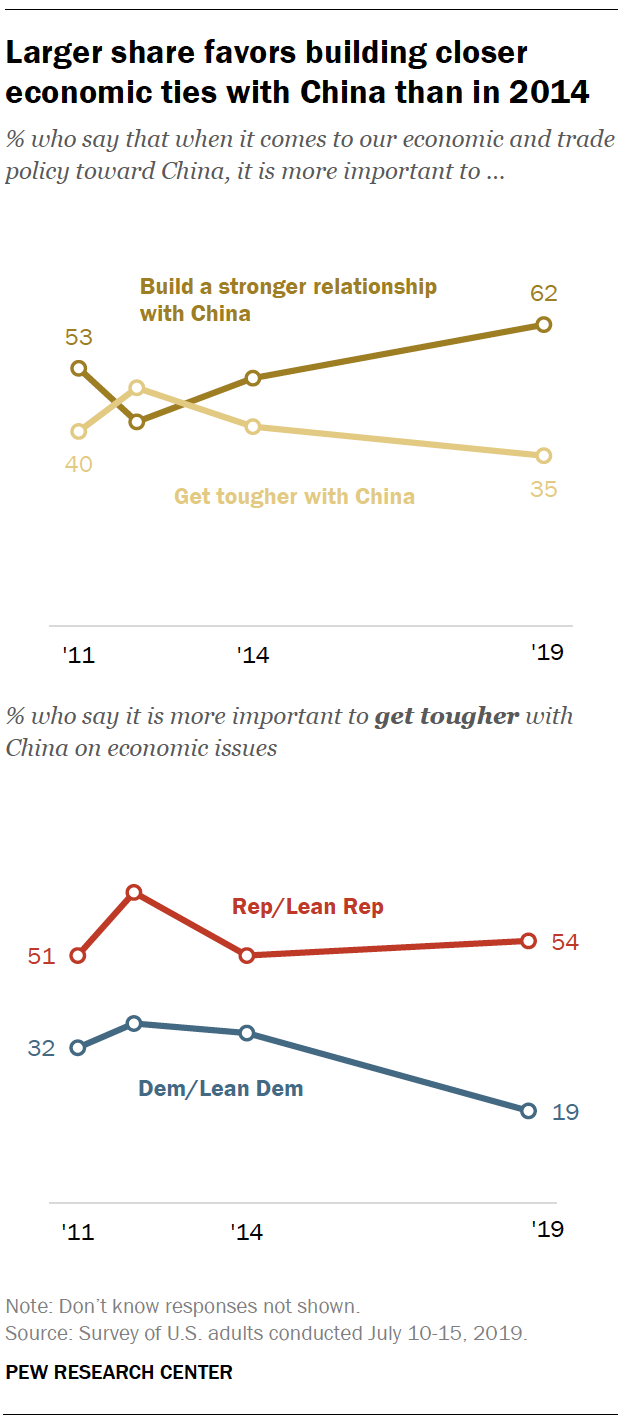
Nearly two-thirds of adults say that when it comes to economic and trade policy toward China, it is more important to build a stronger relationship with China on economic issues (62%) than to get tougher with China on economic issues (35%). This is the highest share saying this since the question was first asked in March 2011.
As in the past, Republicans are more likely to prioritize getting tougher on China over building a stronger relationship. Today, 54% say it’s more important to get tougher with China on economic issues, while 44% say it is more important to build a stronger relationship with China.
There are substantial ideological differences among Republicans on this issue: 60% of conservative Republicans prioritize getting tough on China over building a stronger relationship with China. By comparison, moderate and liberal Republicans are somewhat more likely to place importance on building a stronger relationship (54%) than on getting tougher on China.
Over the past several years, Democrats have grown less likely to say it is more important to get tougher on China on economic issues. Just 19% say this today, down from 32% in 2011.
Majorities in both parties now say free trade agreements have been good for the U.S.
About two-thirds of Americans (65%) currently say free trade agreements between the U.S. and other countries have been a good thing for the United States – an increase of 9 percentage points over the past year, and a substantial shift in public opinion since the eve of the 2016 election (when roughly equal shares said trade agreements were a good thing – 45% – as said they were a bad thing – 43%). Views of free trade agreements are now more positive than at any point in the last decade.
For the first time since the 2016 campaign, more Republicans say free trade agreements have been a good thing for the United States than say they have been a bad thing. Today, 59% of Republicans and Republican leaners say free trade agreements have been a good thing for the country; 29% say they have been a bad thing. The current balance of opinion within the GOP is similar to views in the spring of 2015, when 56% said trade agreements were a good thing and 34% said they were a bad thing.
Nearly three-quarters of Democrats and Democratic leaners (73%) now say free trade agreements are good for the country, up from 67% last spring. Democratic views of free trade agreements have long been more positive than negative, but they are now more positive than at any point since the question was first asked in 2009.
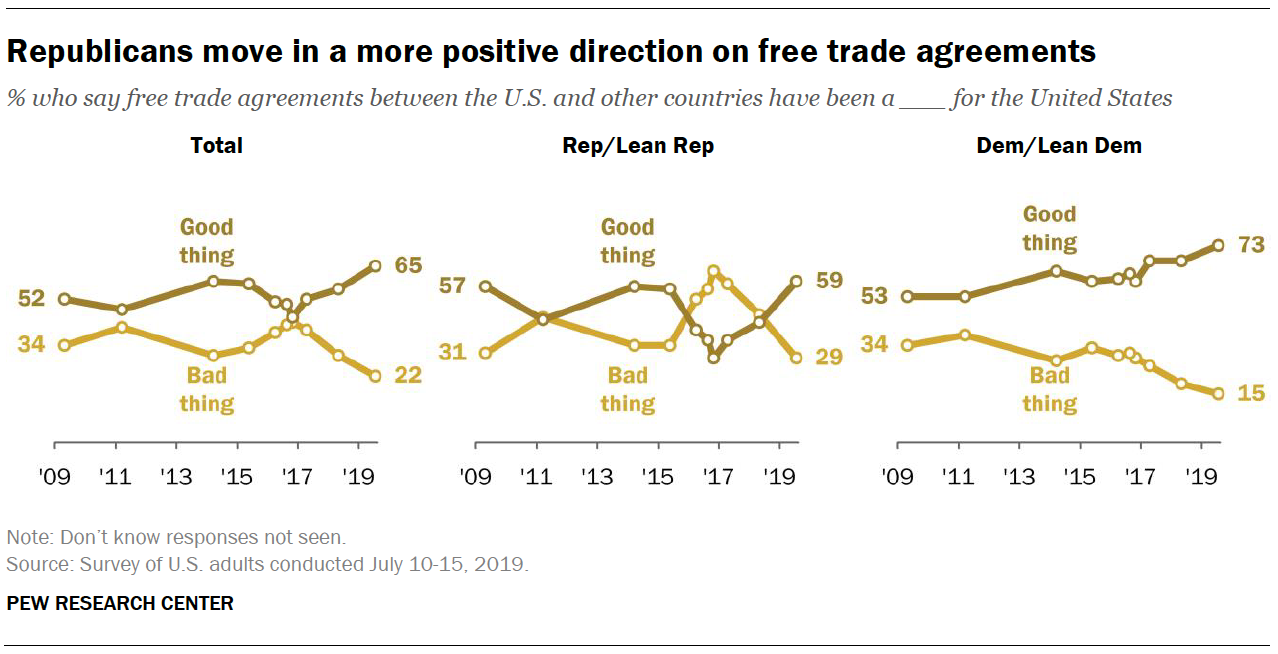
Most Americans say tariff increases have been bad for the nation
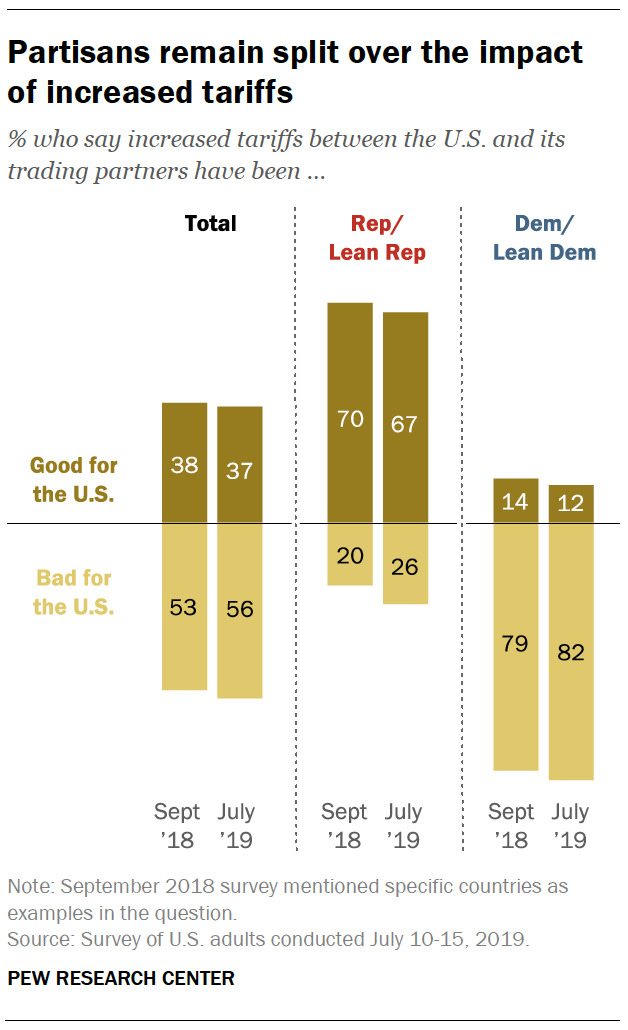
A majority of Americans (56%) say that increased tariffs between the U.S. and its trading partners have been bad for the country, while just 37% say they have been good for the country.
Overall attitudes about tariff increases are little changed since last fall. Republicans and Republican leaners continue to have much more positive views of tariff increases than Democrats and Democratic leaners. About two-thirds (67%) of Republicans say that tariff increases have been good for the U.S., while just 26% say they have been bad for the country (the share of Republicans saying they have been bad for the country is slightly higher than it was in September). By comparison, about eight-in-ten Democrats (82%) say these increases have been bad for the country, and these views are little changed in recent months.
Most say Trump should focus on domestic rather than foreign policy
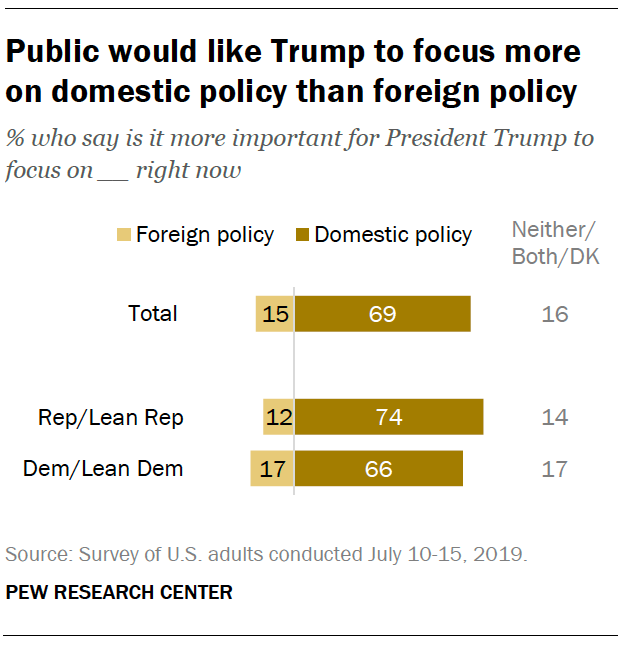
For more than a decade, overwhelming majorities of Americans have said that it is more important for the president to focus on domestic policy than foreign policy. Today, about seven-in-ten say it is more important for President Donald Trump to focus on domestic policy right now (69%), little different than the share saying this shortly before he took office or the shares who wanted Barack Obama to focus on domestic policy in the years prior.
There are only modest partisan differences on this question, with Republicans (74%) slightly more likely than Democrats (66%) to prioritize a focus on domestic issues. Still, two-thirds or more in both parties say a domestic policy focus is more important.
A growing share of Republicans say global respect for U.S. has increased
A majority of Americans have long held the view that the United States is “less respected by other countries than in the past,” including 57% who currently say this. But the share of Republicans who say this is now lower than it has been in Pew Research Center surveys dating back to 2004.
At the same time, the share of Democrats who say the U.S. is less respected remains near a record high. As a result, the 53 percentage point partisan gap in the share saying the U.S. is less respected than in the past is wider than at any point in the last 15 years.
Overall, 57% of adults overall say that, compared with the past, the U.S. is less respected by other countries these days, while 20% say it is more respected and a similar share (21%) say it is about as respected as it has been in the past.
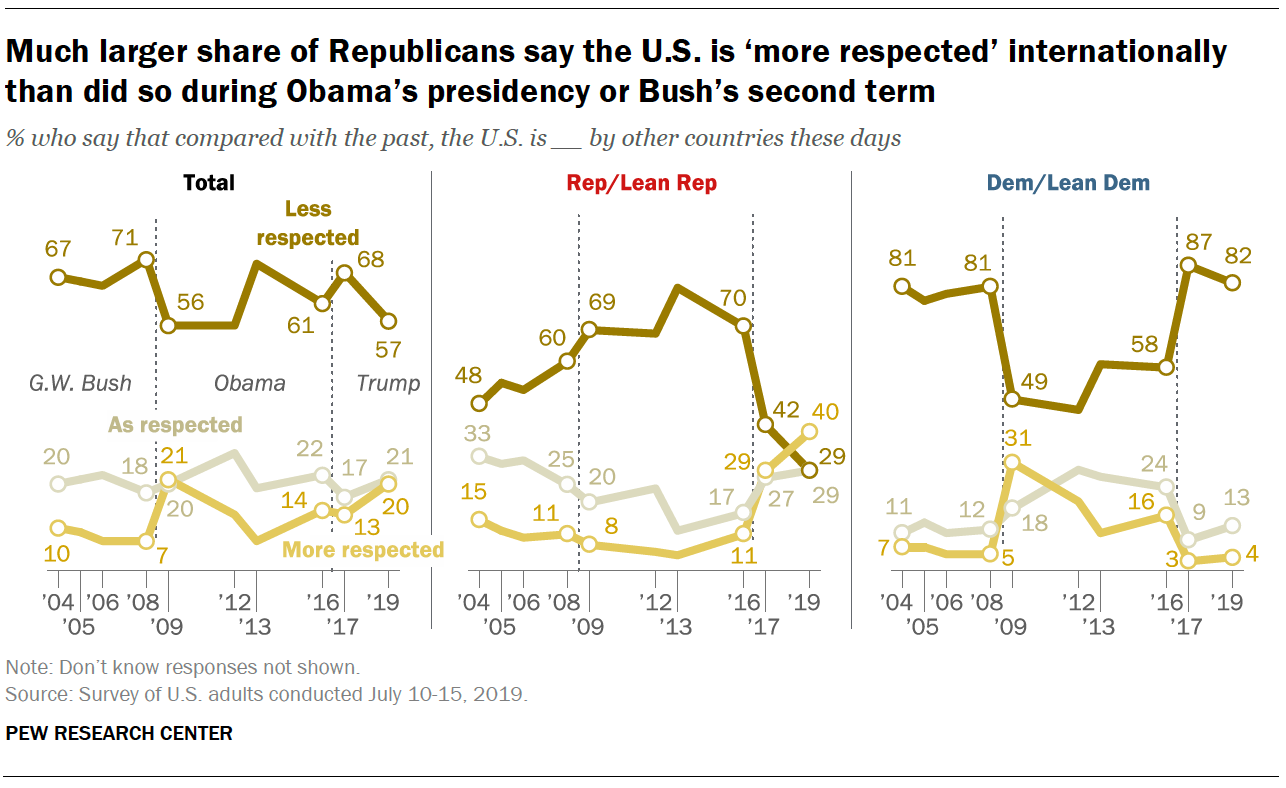
Partisan views on this question shift depending on which party controls the White House. Throughout George W. Bush’s second term, Democrats were much more likely than Republicans to say respect for the U.S. had declined, while the reverse was true during Obama’s presidency.
This pattern has continued during Trump’s presidency, but Republicans are now far more likely to see greater international respect for the U.S. than they did under the Obama administration or in Bush’s second term. Today, 40% of Republicans say the U.S. is more respected by other countries these days compared with the past, up from 29% in October 2017. This marks the first time in the past 15 years that the share of Republicans saying the U.S. is more respected is higher than the share saying it is less respected.
